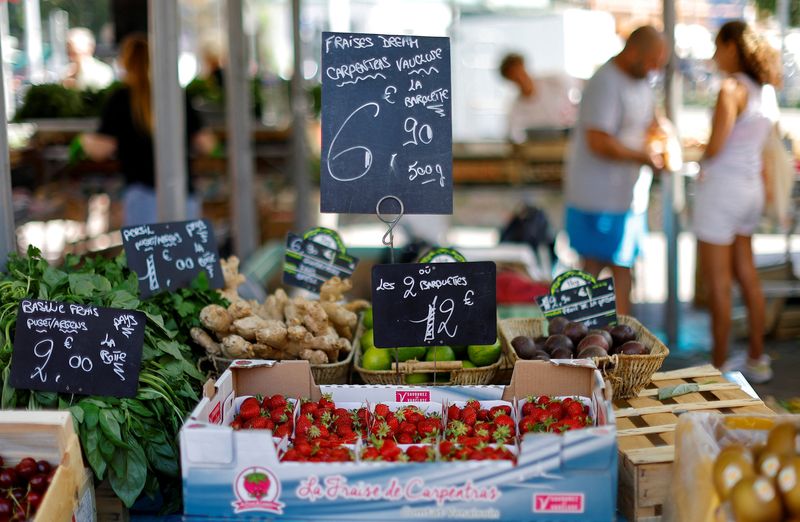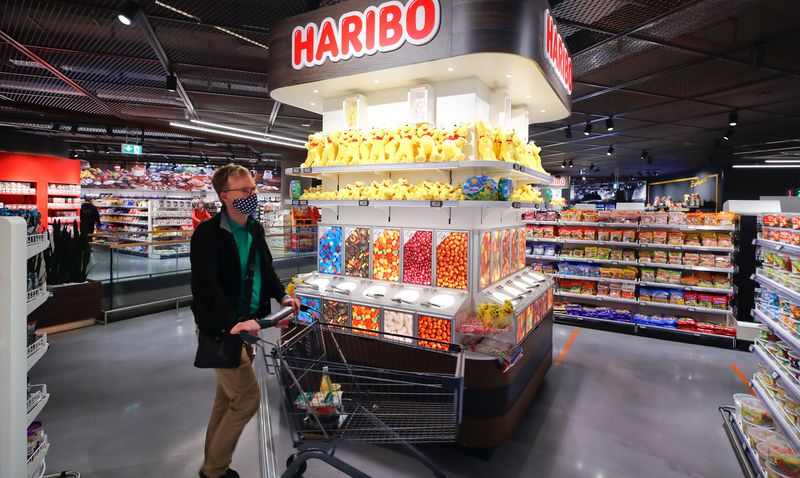FRANKFURT (Reuters) -Euro zone inflation eased far more than expected in November, raising hopes that sky-high price growth is now past its peak and bolstering, if not outright sealing the case for a slowdown in European Central Bank rate hikes next month.
Consumer prices in the 19 countries sharing the euro grew by 10.0% this month after a 10.6% increase in October, coming in well below expectations for 10.4% in a Reuters poll of analysts.
The overall picture is more nuanced, however, as energy prices accounted for the bulk of the slowdown while underlying price growth remained stubbornly high and food prices, a key worry, continued to rise, Eurostat data showed on Wednesday.
With inflation running at more than five times its 2% target, the ECB has raised interest rates at its fastest pace on record this year and a string of hikes over the coming months is still likely as price growth will take years to tame.
But some policymakers have recently made the case for a 50 basis point rise on Dec. 15 after back-to-back 75 basis point moves, arguing that inflation is finally peaking and that the ECB has made enough progress to justify more modest steps.
"While we're far from out of the woods yet, it does look like the current economic environment could push the European Central Bank to a smaller 50 bp hike next month," ING economist Bert Colijn said.
Market bets, which had been split between moves of 50 and 75 basis points, moved sharply on Wednesday's data and investors now see a 50 basis point move as the most likely outcome for December.
While the dip in headline prices, the euro zone's first in well over a year, strengthens the case for more measured ECB action next month, Wednesday's data could also fuel fears that inflation will prove more persistent than expected.
Underlying price growth, excluding volatile food and energy prices, remained high, which is likely to trigger warnings from conservative central bankers, while food price growth, a key concern for governments, shows little sign of peaking.
Filtering out food and fuel costs, inflation rose to 6.6% from 6.4%, defying expectations for a drop, while an even more narrow measure that also excludes alcohol and tobacco held steady at 5.0%.
Inflation for processed food, alcohol and tobacco, a key category, meanwhile accelerated to 13.6% from 12.4%.
"This does not mean that the battle against inflation has been won," Commerzbank (ETR:CBKG) economist Christoph Weil said. "The underlying upward pressure on prices is unlikely to abate."
"The core inflation rate is unlikely to peak until mid-2023 and will only fall slowly thereafter."
Another complication is that economic growth is not flagging as much as some had anticipated, meaning that the deflationary impact of a looming winter recession is likely to be more modest than once thought.
Initially fuelled by global supply bottlenecks as economies reopened after pandemic, inflation has been driven this year by energy costs which surged after Russia invaded Ukraine and soaring food prices related to the war and poor harvests.

Inflation could still edge back up in the coming months, especially at the turn of the year when energy contracts get repriced, but it is likely to decline through 2023 and return to the vicinity of 2% by the end of 2024.
Such a rapid decline lacks historical precedence, some policymakers warn, suggesting that today's small decline is unlikely to be a game-changer for where rates end up over the cycle of monetary tightening.
